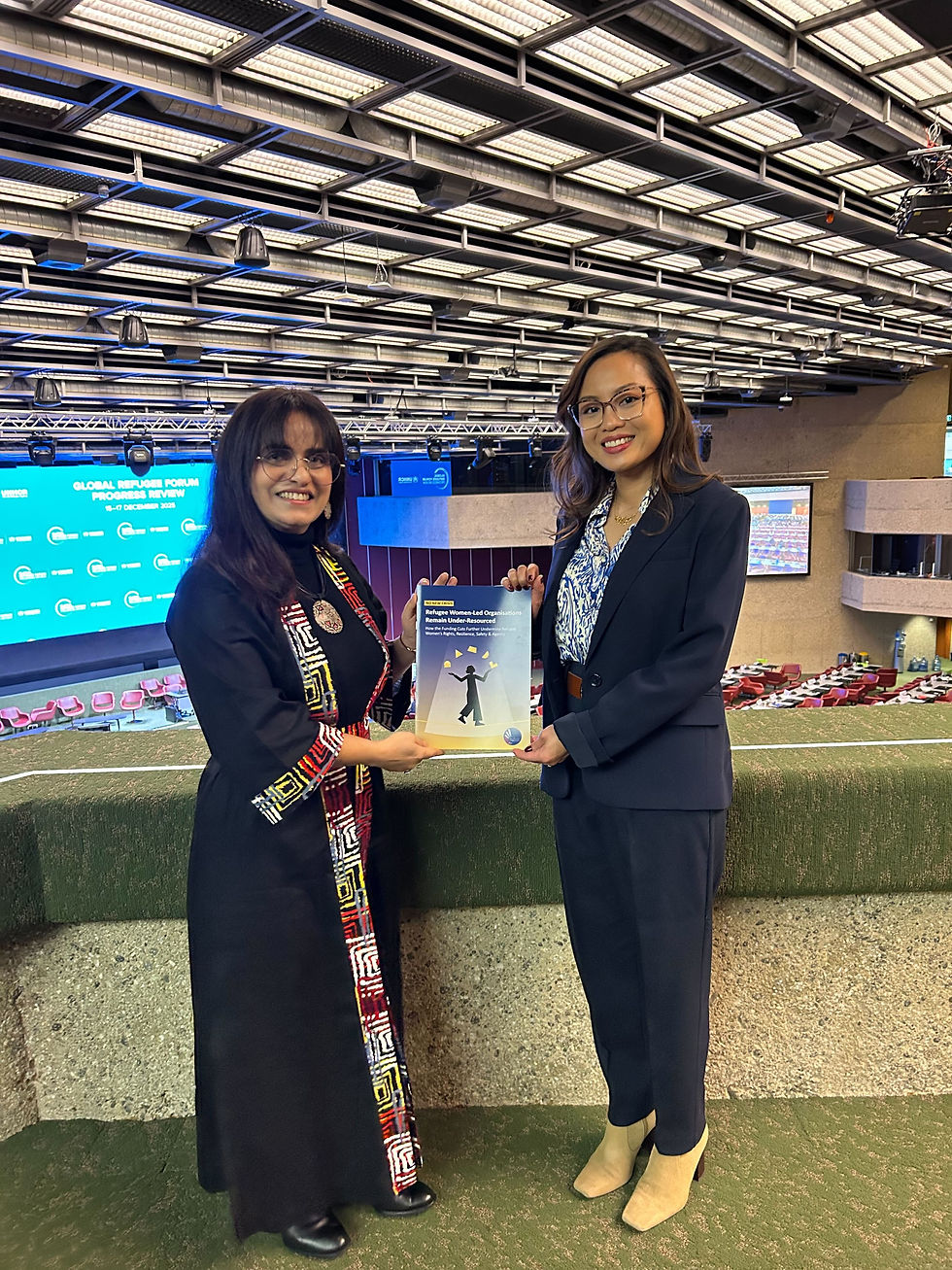COP28 in Dubai - Feminist Leadership in Climate Action in the context of Displacement and Migration
- Communication NWC
- Dec 21, 2023
- 6 min read
From November 30th to December 12th 2023, countries around the world convened in Dubai for the UN Climate Conference: COP28. This annual climate summit is an opportunity for countries worldwide to negotiate plans to reduce greenhouse gas emissions and mitigate the consequences of climate change. Read this blog post to learn more about what New Women Connectors delegation did during the summit.
COP meetings serve as a platform to establish new binding agreements to address climate change in line with the goals of the Paris Agreement, adopted in 2015. In Paris, during COP21, nearly 197 countries agreed on a roadmap to eliminate all greenhouse gas emissions by 2050. The Paris Agreement stipulates that global temperatures must not rise more than 2 degrees Celsius by the end of the century. Additionally, efforts are to be made to limit the global temperature increase to 1.5 degrees Celsius.The Paris Agreement applies to all countries, although it is expected that developed nations will take on a larger share of responsibilities.
The lead up to this year’s climate summit, held in Dubai, was marked by controversies and accusations of greenwashing. Indeed, the United Arab Emirates (UAE) ranks among the top 10 oil-producing countries globally. Additionally, the President of the UN Climate Summit in Dubai, Sultan Ahmed al-Jaber, also serves as the top executive of the state-owned oil company in the Emirates. Moreover, the authoritarian state of UAE, where free speech or questionning the regime is not allowed, was strongly criticized for repeated and systematic human rights violations. Several international NGOs such as Amnesty International or Human Rights Watch had expressed concerns ahead of COP28, as it is known that targeted digital surveillance has repeatedly been used by UAE to eliminate dissent views from the public sphere. In addition to these concerns, the preparation and execution of COP28 relied on migrant workers (they form 88% of the UAE population), many of whom have faced labor abuses.

Seyran Khalili, Feminist Lead for Climate Justice at New Women Connectors at COP28 in Dubai
While the tenure of the COP28 itself was questionable, it was very important for us at New Women Connectors to participate in this high level international meeting. Indeed, our CoFe Table Talks had pointed out 2 major issues when it comes to advocating for climate justice: first, grassroots and indigenous knowledges are multiple and relevant but not valued on decision making level; second, while women tend to be the first responders to climate change, and therefore hold unique resilient knowledge on how to adapt to the increasing extreme weather conditions, they lack sustainable funding to develop long term solutions based on that knowledge. Hence, it was important for us as an intersectional organization to be present at COP28 in order to represent our communities - people in displacement settings, and in particular women - and articulate their voices on such decision making level.
Together with the German Federal Ministry for Economic Cooperation and Development (BMZ), UN Women, Friedrich-Ebert-Stiftung and the Global Centre for Climate Mobility, New Women Connectors hosted during COP28 the event: ‘Feminist Leadership in Climate Action in the Context of Displacement and Migration’, on the 4th of december for the thematic day of Gender Equality.
Speakers from the event 'Feminist Leadership in Climate Action in a context of Disaplcement and Migration', moderated by Anila Noor, Founder of New Women Connectors
To start off the event with a reality check, 2 story tellers were invited on the stage to share stories from their countries and how their respective communities have adapted to climate Change. Olanike Olugboji-Daramola, founder and Executive Director of Women Initiative for Sustainable Environment, started by telling tales from when she first became politically and socially active. Quickly, she realized that women were the one’s working with natural resources, such as land and water, and hence the first one’s to feel the consequences of changes in nature. Yet, they are almost completely absent from decisions such as the planning of interventions after a natural disaster, which makes little sense.
“I found out that every environmental challenge that I was interested in, whether it was water, food, anything economic also, anything that had to do with living a better life, every time, it took me back to the doorsteps of women in the community” - Olanike Olugboji-Daramola, Women Initiative for Sustainable Environment.
The second story teller was Zeina Moneer, Academic and Environmental Journalist, specialized on the MENA region. She touched upon the idea of a “green spring” in the MENA region, referring to the Arab spring, which wasn’t only about political mobilization: environmental issues played an important role.
“Climate change is a threat multiplier. It escalates social, political and economic tensions globally, but especially in developing countries that bear the burden of climate impact” - Venge Nyirongo, Intergovernmental Specialist - UN Women.
Sofia Gutierrez, ecofeminist activist from the NGO Barranquilla+20, led the conversation towards the topic of forced displacement, by speaking of her country Columbia, where legal and illegal extractivism, added to armed conflict and coupled with climate change has led the country to have one of the largest internally displaced population in the world. Sofia mentioned the continuous cycle of displacement and migration within the city of Bogota, which has lead to generational trauma being passed on from one generation to another. But that’s not the only thing that has been passed on: Sofia talked about “generational resistance” as a form of resilience and power that gets passed on from one generation to another. Women play a key role in that transmission as they are the ones responsible for keeping their communities together and finding new homes whenever they are forced to move.
Following up on that point, Salote Soqo from the Unitarian Universalist Service Committe - an NGO that advances human rights through grassroots collaboration - adds that when arriving to new places, the knowledge and culture of indigenous communities does not disappear: it “expands to other communities' '.
“Our indigeneity doesn't go away when we are displaced or when we do migrate to a foreign country. Our community remains with us (...) The indigenous women in the countries of migration or in host communities, their radical ways of caring doesn't end: it expands to other communities” - Salote Soqo, Unitarian Universalist Service Committee
But Salote Soqo also mentioned a serious problem: women, indigenous women in particular, are overburdened and exhausted. She spoke in particular about indigenous women from Pacific Islands: adding to their responsibilities over their families, women whose families have been forcibly relocated due to climate disasters tend to take on the responsibilities of community’s men, as the men struggle to deal with the trauma of being displaced. Adding to that, indigenous women who have made it to another location are forced to engage in inhuman labor schemes as they are responsible for sending money back home, to support their communities and their cultural preservation.
This links back to one of the main remarks that stood out from our Cofe Table Talks, which Seyran Khalili, Feminist lead for Climate Justice at New Women Connectors presented during the event: there is a serious lack of sustainbale funding that go directly to women, their grassroots organisations and indigenous communities. This is linked to the fact that their knowledge, which comes from hands on experience dealing with climate issues in their everyday life, is not considered “technical” enough and hence not valued.
“The climate crisis is not gender neutral, and our response to it can not be either” - Venge Nyirongo, Intergovernmental Specialist - UN Women.
As a response to this increasing burden on the shoulders of women from displaced communities - but little help from bigger organizations and funders - panelists discussed a number of solutions. Shruti Narayan, C40's Regional Director, mentioned the need to develop data-driven climate action plans, involving all stakeholders, including community leaders that have grassroots expertise. Venge Nyirongo, from UN Women, insisted on the fact that in order to address specific situations of vulnerability that women and girls are facing in displacement context, international organizations, funders and states need to work towards implementing gender responsive and evidence based policies.
Finally, Anila Noor, founder of New Women Connectors and moderator of the panel, ended the event by reminding how important it is to always address issues with an intersectional lens. Indeed, she recently visited a factory in Dhaka, Bangladesh, where women are working on reusing old garments to produce hygienic products for themselves to use during their period. While this initiative seems positive and in accordance with the zero waste movement, the women working in these factories are majorly illiterate, very poor and from conservative backgrounds. A majority of them are displaced within the country and have come to Dhaka due to climate change making their region of origin inhabitable. They now work from 9 to 9 everyday, in difficult conditions, and for a wage lower than 5€ per month. Without looking at solutions for the environment with an intersectional lense, we might fail to see how people in certain situation - in particular women forcebly displaced - can suffer from exploitation on many different levels.
Watch the full event below or by clicking HERE.
Being part of COP28 was exiting, inspiring, exhausting and intense. We have learned a lot as an organization and are more determined then ever to make sure that women, in particular migrant and refugees, get meaningfully included in decison making when it comes to fighting climate change and making climate justice.
To read more about our experience in Dubai, read the insights from COP28 of Seyran Khalili, our Feminst Lead for Climate Justice.
And stay tuned for our upcoming projects to ensure climate justice!





_edited.png)







Comments